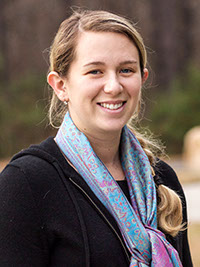Each year, The Graduate School honors graduate students in programs throughout our University for their powerful discoveries that contribute to a better future for people and communities in North Carolina. We're pleased to present 12 Graduate Education Advancement Board Impact Awards and seven Horizon Awards for 2017.
The longstanding GEAB Impact Award recognizes discoveries with a direct impact on our state in the present time. New for 2017, the Horizon Award recognizes discoveries with future potential to benefit North Carolina (and beyond).
Doctoral and master's students, working in close collaboration with their faculty mentors, pursue promising new ideas. They then apply their new knowledge to improving human health, strengthening communities and creating greater understanding of our world's biggest challenges. That innovation is something to celebrate. We hope you enjoy reading about the inspiring discoveries of our 2017 GEAB Impact Award and Horizon Award recipients.
View all of the 2017 Horizon and Impact Award winners and their projects
Exploring Bacteria's Defenses to Support Antibiotic Creation
Rachel Bleich, Pharmaceutical Sciences
Horizon Award
Testing for Antibiotic Resistant Bacteria in Environmental Waters
Katy Brown, Environmental Sciences and Engineering
Horizon Award

"Katy has contributed new insights into the presence of highly antimicrobial resistant enteric bacteria in a representative urban community and the extent to which these bacteria enter the aquatic environment and potentially impact downstream uses of this water. Her evaluation methods are simple yet powerful enough to gain wide use both locally and globally."

"Julia is tackling a significant public health issue in our state: the premature death of individuals with schizophrenia. The beauty of her research is that it can be disseminated to mental health clinics statewide and does not require specialized clinician training or resources. The brightness of her academic career is matched by her passion for helping this clinical population."
Studying Pottery, Food Processing Habits to Uncover Catawba Nation History
Mary Beth Fitts, Anthropology
GEAB Impact Award
The Role of Messaging in Reducing STI Transmission
Diane Francis, Media and Journalism
GEAB Impact Award
Examining Charlotte Housing Authority's Work Requirement
Kirstin Frescoln, City and Regional Planning
GEAB Impact Award

"There is very little research on the effects of work requirements on public housing residents who would lose their housing assistance if they do not work. Kirstin's dissertation research has the potential to have wide-ranging implications for housing policy and practice in Charlotte and throughout the United States."
Stormwater Ponds and Their Connections to Coastal Water Quality
Adam Gold, Environment and Ecology
GEAB Impact Award
Detecting Heart Risk Factors for Farmworkers
Maggie Reinsvold, Public Health Leadership
GEAB Impact Award

"Dr. Stern's research was particularly innovative and impactful. It was the first nationally representative set of studies that showed that low-income and minority shoppers did not just shop at local small bodegas or similar small stores that had no produce or healthy food but rather they all shopped at a mixture of stores—from supermarkets to large club stores to small local stores that represented what we call food deserts."
Water Quality, Health Disparities in Wake County
Frank Stillo III, Environmental Sciences and Engineering
GEAB Impact Award
Environmental Justice Issues Related to Coal Ash
Libbie Weimer, City and Regional Planning
GEAB Impact Award
Analyzing Cell 'Snapshots' to Improve Heart Disease Treatment
Joshua Welch, Computer Science
Horizon Award
Helping N.C. Communities Plan for Climate Change
Sierra Woodruff, Environment and Ecology
GEAB Impact Award
Algorithms That Support Faster, More Accurate Diagnoses
Gongting Wu, Physics and Astronomy
Horizon Award

"Gongting has developed and implemented software that is uniquely tailored to the nanotechnology-based breast and lung imaging systems invented at UNC. These new imaging systems will have the potential to increase the sensitivity of detecting breast and lung disease such as cancer and cystic fibrosis, benefiting a large population of patients including pediatric and young children."